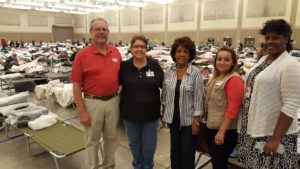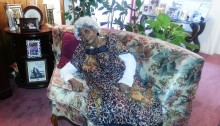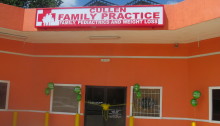Last week, Rep. Waters met with retired Lieutenant General Russel L. Honoré, who was Commander of the Joint Task Force Katrina; former Louisiana Congressman Cleo Fields; representatives from FEMA, HUD, and SBA; and Red Cross volunteers at the Baton Rouge River Center Shelter to see how they are helping Louisiana residents affected by the devastating flood find housing and getting businesses back up and running WASHINGTON — In the wake of historic flooding in the Baton Rouge, La., area, Congresswoman Maxine Waters (D-CA), Ranking Member of the Committee on Financial Services and long-time friend to the Louisiana area, visited the disaster-affected region. Rep. Waters met with local officials as well as affected residents to review the damage, assess the federal government’s response thus far, and understand key issues ahead of the need to reauthorize the National Flood Insurance Program (NFIP) by September 30, 2017. “Seeing the devastation of this historic flooding first-hand was both humbling and upsetting. I saw streets that were still covered in debris and families that had lost everything. But just as I was 11 years ago in the aftermath of Hurricane Katrina, I am once again awed by the strength and resiliency of the people of Louisiana in the face of disaster. “While the local leaders and residents I spoke to told me they were pleased with FEMA’s swift response to the disaster so far, I remain very concerned about the number of residents who were wholly unprepared for this disaster through no fault of their own. Too many Americans receive outdated and incorrect signals from the National Flood Insurance Program (NFIP). As Ranking Member of the Financial Services Committee with jurisdiction over the NFIP, I will make sure that as we continue to think through its reauthorization that we take into consideration the inadequacy of our flood maps. “I must note that despite the destruction caused by Hurricane Katrina, the people of Louisiana came together to rebuild and I was proud to stand alongside them and to support them as they did so. In the aftermath of yet another disaster of historic proportions, I pledge my continued support for the people of Louisiana.” During her visit, Rep. Waters met with officials at the Federal Emergency Management Agency’s Joint Field Office in Baton Rouge to hear about their recovery efforts thus far. She also visited the Baton Rouge River Center Shelter — an emergency shelter where over 850 people are still stranded — as well as the New Hope Baptist Church, Disaster Recovery Center where disaster victims can go to apply for aid from FEMA and the Small Business Administration (SBA). This trip is reflective of Rep. Waters’ longstanding commitment to the Louisiana area. She was one of the first Members of Congress to visit the state following the devastation of Hurricane Katrina and she authored legislation, “the Katrina bill” (H.R. 1227 in the 110th Congress), to help the Gulf Region recover from the storm. In the aftermath of Katrina, Rep. Waters also held multiple field hearings in the region, fought for disaster recovery funds and their fair use, and helped displaced residents return to their homes. Additionally, Rep. Waters has worked extensively on bipartisan efforts to improve the National Flood Insurance Program, playing a key role in the passage of the Homeowner Flood Insurance Affordability Act (HFIAA), which was signed into law on March 21, 2014. The law made clear that addressing affordability was to be a top priority of the NFIP. The current authorization for the NFIP expires on September 30, 2017 and as Ranking Member of the Financial Services Committee, Rep. Waters is taking a lead role in preparing for the reauthorization of that program. After the recent flooding in Louisiana, Rep. Waters sent a letter to President Obama, urging him to do everything in his power to waive any cost-sharing requirements that would pose additional financial burdens on the state of Louisiana. She also joined with Reps. Emanuel Cleaver (D-MO) and Cedric Richmond (D-LA) to send a letter to Chairman Jeb Hensarling (R-TX), calling on him to hold a field hearing in Baton Rouge to assess the federal government’s response and educate Committee Members about key issues in advance of the reauthorization of the NFIP. |
Category Archives: Health
Medical Screening Media Day at UH College of Pharmacy
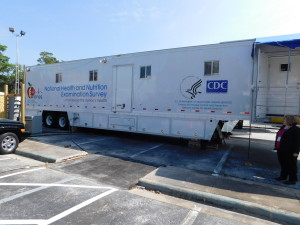
With the National Health and Nutrition Examination Survey (NHANES), also came Media Day, as access to the rooms was given by tour outside the Texas Medical Center.
Located near the University of Houston College of Pharmacy, the survey’s media day travels across the country, and now made Harris County its traveling stop. Medical Examination Center (MEC) Manager Baldemar Gomez talks about the participants who are randomly chosen to take these medical studies.
“They (the participants) are a mix of gender, age, and ethnic background,” Gomez said.
“They also do a household interview which can last to about an hour.”
In detail, the survey’s study director Jenni Echols explains the process of choosing the participants for the checkups.
“We form small groups, about 24 groups, and then we selectively sample about 30 households within each group,” Echols told.

“A computer algorithm randomly selects some, all, or none of the household members,” Echols said.
Established since 1959, the National Health and Nutrition Examination Survey have conducted studies of health and nutritional statuses of individuals living in the United States, like the title given in the survey group. What makes this survey unique from all others is that it combines interviews and physical examinations. Julissa Oviedo, a volunteer, took part of those exams as the medical staff held a run-through to test the equipment. Although Julissa speaks Spanish only, she was delighted to know about a few bilingual members there who speak her language, as, she said, they made her feel comfortable to be here and testing the equipment for efficiency.
Steve Trumbore, on the other hand, isn’t a volunteer and works in the lab as their technician. He was chosen by a process NHANES makes to bring qualified individuals in their staff.
“What they do is advertise,” Trumbore said.
“For instance, if a doctor were to quit, they advertise for another doctor.”
Trumbore also said that those in their respective fields are chosen to do their field of study.
“If they get lab techs, they got to be licensed lab techs. The ideate people are dieticians,” Trumbore said.
One of the things the Pennsylvanian native does is the lab work of the samples, including a prediabetes test called the glucose tolerance test.
To an extent, the glucose tolerance test is done after the participant, male or female, completes a blood test out of the many tests and physical examinations in the survey. Then, the participant ingests a sugar solution liquid, takes their second blood test, and later shows how the body breaks down the sugar and provides that information to the participant. All test results and individual’s information, whether they volunteered or participated, is kept confidential.
NHANES will do this at their next destination in an upcoming U.S. state or county.
Medical Screening Media Day

With the National Health and Nutrition Examination Survey (NHANES), also came Media Day, as access to the rooms was given by tour outside the Texas Medical Center.
Located near the University of Houston College of Pharmacy, the survey’s media day travels across the country, and now made Harris County its traveling stop. Medical Examination Center (MEC) Manager Baldemar Gomez talks about the participants who are randomly chosen to take these medical studies.
“They (the participants) are a mix of gender, age, and ethnic background,” Gomez said.
“They also do a household interview which can last to about an hour.”
In detail, the survey’s study director Jenni Echols explains the process of choosing the participants for the checkups.
“We form small groups, about 24 groups, and then we selectively sample about 30 households within each group,” Echols told.
“A computer algorithm randomly selects some, all, or none of the household members,” Echols said.
Established since 1959, the National Health and Nutrition Examination Survey have conducted studies of health and nutritional statuses of individuals living in the United States, like the title given in the survey group. What makes this survey unique from all others is that it combines interviews and physical examinations. Julissa Oviedo, a volunteer, took part of those exams as the medical staff held a run-through to test the equipment. Although Julissa speaks Spanish only, she was delighted to know about a few bilingual members there who speak her language, as, she said, they made her feel comfortable to be here and testing the equipment for efficiency.
Steve Trumbore, on the other hand, isn’t a volunteer and works in the lab as their technician. He was chosen by a process NHANES makes to bring qualified individuals in their staff.
“What they do is advertise,” Trumbore said.
“For instance, if a doctor were to quit, they advertise for another doctor.”
Trumbore also said that those in their respective fields are chosen to do their field of study.
“If they get lab techs, they got to be licensed lab techs. The ideate people are dieticians,” Trumbore said.
One of the things the Pennsylvanian native does is the lab work of the samples, including a prediabetes test called the glucose tolerance test.
To an extent, the glucose tolerance test is done after the participant, male or female, completes a blood test out of the many tests and physical examinations in the survey. Then, the participant ingests a sugar solution liquid, takes their second blood test, and later shows how the body breaks down the sugar and notifies that to the participant. All test results and individual’s information, whether they volunteered or participated, is kept confidential.
NHANES will do this at their next destination in an upcoming U.S. state county.
109-year-old independent woman speaks of what she knows for sure
Working in the fields plowing and chopping cotton was one of Mrs. Emma Primas favorite things to do as a youngster on her family farm back in Cold Springs, TX. The 109-year old now is one of Houston’s oldest and most vibrant resident. “I did everything on the farm until I was about 10-years-old. We didn’t start school until we were around that age because we had to work in the fields. I loved to plow. I had an old mule name Julie. We would plow and plant together. Old Julie loved that. But when it came to 12 o’clock, old Julie wasn’t going another step. That mule could tell time by looking up at the sun. And she would call out ‘wonk, wonk wonk’, to let me know it was time to stop. You could whip those legs all you wanted. Old Julie wasn’t going another step,” said Primas.
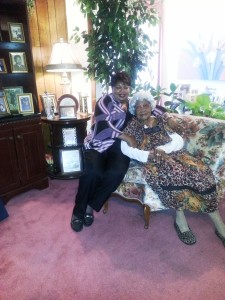
Farm life for Primas was one that taught her about balance in life — hard work, money management and enjoyment. After a working through the day and helping to care of family business, Primas would go to the farm lake to relax and fish. “We had a mill on our property for grinding whole corn. We also raised sugar cane. Everybody had their own and would help each other. We were a community” Primas said.
The Japanese would come by and go to all of the neighbors and collect sugarcane and process it. Each neighbor would have it grind up and cooked. They would also grind it into sorghum. It’s something like molasses, not as sweet though. I really liked it, “she said.
As a community, Primas detailed how children were brought up during her childhood era. She said that people in the country helped raised each other’s children. If the children were not behaving that the neighbor would “get after them” and that the discipline didn’t stop there. “Neighbors didn’t mind whipping other neighbors’ kids. And then they would tell the parents and the parents would sometimes whip them again. Not today, if you touch somebody’s kids, you better have a 45 (caliber) and some money,” she said.
Finding Jesus
Born in 1905, Primas grew up in Cold Springs in east Texas rural area off Texas Highway 156 about 63 miles north of Houston in San Jacinto County. She had an extraordinarily awakening at age of 10. Primas told the story of her very first encounter with the Spirit of God and the Mona Bench. It is a backless long bench made original of stone. But at Primas’ childhood place of worship it was made of wood. It puts you in the mind of a long wooden backless church pew.
“We had to go before what you call a “Mona Bench.” [mourning bench, the place to prepare for spiritual conversion and baptism] during revival meetings. There certain people would pray for us; then touch us in the back. We would run all over the place. One night we all got happy. We found Jesus. Then, the old people told us that we hadn’t found Jesus. So they made us go back to the ‘Mona Bench’ again,” Primas said.
“And when we got back there, we couldn’t stay there. We were so happy. And we had what you called the Holy Ghost. We were saved,” said Primas. This perfect state of euphoric Primas said had her feeling light as a feather. And that it was like she wanted to fly all the time. As though she could take up wings and fly. She said it was like a feeling she had never felt before. “Lord, I prayed so hard. They told us how to pray and what I felt, I knew it could have only been the Lord. And it wasn’t man that had me like that. The ‘Mona Bench’ was there to save our souls,” she said.
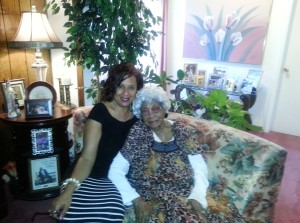
School and Work
As a teenager, Primas enjoyed going to school and working. After school, she would go to white people homes and wash dishes where she got paid $2.00 to $3.00 for a day’s work. “And baby, we were rich with that money. That was big money. You could buy 10 sticks of candy for a nickel. Oh baby, we got a dollar and we thought we were ‘nigger rich’ because we could buy anything we wanted. And we enjoyed it so much,” Primas said. Her favorite subjects in school were reading, arithmetic and geography, and while reminiscing and smiling, she said, “I really liked reading geography,”
Working Woman
After she moved to Houston, she married and had one daughter. She enjoyed Houston but heard that jobs and opportunities were plentiful in California. She and her family packed-up and moved. “I got word that things were real good in San Francisco. I got me a job working at The Sir Francis Drake Hotel where I was a salad girl. Every other week, I made $40.00. I told my in-laws that I wanted to do something I never done before. I wanted to drive a street car. So I got a job operating a street car until I got tired and wanted to quick,” Primas said.
Primas didn’t quick and continued to work for an additional year based on a promise from management for better jobs. “We were told if we kept working and give the soldiers a rest; since the war (WWI) was over, that we would get promotions. They didn’t do what they said. So after that year, I found me some other work,” Primas said.
Finding new employment in northern California was no problem for Primas. She landed a position as a dietician assistant for a school and within months found herself over cafeteria menus for five schools. “I made $15.00 dollars a day for each of those schools. I saved my money, and when I came back to Houston, I was loaded,” she said.
Taking Care of Business
Primas has always been a money manager and kept her eyes on the money even when she was married. “I saved money, paid bills and didn’t allow my husband to pay the bills. You have to stay on top of things. I had one husband who bought a lady a pair of shoes”, she said.
“I notice that five dollars was missing from the household. So I went down and wanted to see my husband’s check that had been cashed. They showed it to me. I told him about it. He told me ‘I didn’t work for that check’. That it was his check. I then told him that he was my husband and that’s my check too and that he didn’t pay the bills: that I did,” said Primas.
She further explained that’s why men want to pay all of the bills, so they can have full control. “I was strict and I could be, and if they didn’t like it, they could keep going. I wasn’t like a lot of women waiting on a man to give me a few nickels. I worked. And I knew how to do a whole lot of work. Work that some people with lots of education couldn’t take care of,” Primas said.
Miracle
Sickness has only come Primas way when she was 92-years-old and she almost didn’t make it. She was celebrating her birthday at a local restaurant the day before she fell ill. She was laughing and talking with family and she started coughing up some dairy food she had consumed. The following day after church, she came home and had a big bowl of ice cream.
About 30 minutes later she started experiencing terrible stomach pains. She said the pains were just about to cut her into two. At first, she didn’t want to go to the hospital but family and the severe pain had changed her mind. At the hospital blood was taken numerous times and it was determined she had ptomaine poison. (Ptomaine poison is colloquially referred to as food poisoning; any illness resulting from the consumption of contaminated food, pathogenic bacteria, viruses, or parasites).
During Primas’ illness she said, “There were two white doctors seeing about me; a young one and an old one. The young doctor told me that I needed surgery to remove part of my intestines. The old doctor was trying to talk over him and said it was little to be done for someone my age. My daughter told him that was not a nice thing to say. The old white doctor didn’t open his mouth after that,” Primas said.
The young doctor continued with Primas’ assessment. He then reached into his medical jacket and pulled out a Bible. “The little young doctor began reading some scriptures, and wanted to know if it was okay if we prayed. These are the words the young doctor prayed: Father there is nothing I can do. But through you I can do all things. He then ordered a bed so that my daughter could stay overnight with me and told me he would operate on me in the morning. He took the bad part of my intestines out and sewed everything else back together.”
Primas’ granddaughter, Denise Mickey who she now lives with her has been working in the medical field for over 25 years said what that doctor did for her grandmother is unheard of in the medical field. “Doctors normally don’t do what this one did for my grandmother. He had a Bible, asked to pray and acknowledged that God was working through him. And that God has all of the power. Now that’s what you call amazing,” Mickey said.
On Primas’ last post-operative check-up, the young doctor had her daughter to take her down to the old doctor to see how well she had recovered. “That old doctor was amazed to see how well I was living and looked. And he’s the one that told them I was too old for an operation. If I had been his patient, he would have not touched me. He would have sent me somewhere to die,” she said.
Dr. Michael Radcliff of Northwest Memorial Hospital is the young doctor who used the Word of God to save Primas still keeps in contact with her today. He has attended her 100 Birthday Celebration as well as her 101 and 105 Birthday Celebrations. “Anytime I am having something special and we invite him and he comes,” said Primas. “I put my trust in God. Nobody can do these things but Him. Certain things that have been in my path, I know that have only come from Him. My trust and faith are in Him,” Primas said.
Politics
Voting has always been important to Primas. She said back in the day only white men could vote and the white women were mad because they wanted to vote too but couldn’t. “They didn’t let the white women vote at first with them because they thought women were unpredictable. Soon as blacks were allowed to vote, I voted in California. You just had to be 18 there and nothing else. So when I knew I was moving back to Houston, I bought my poll taxes so I could vote in Houston,” Primas said.
On President Obama, she though in her lifetime, she would never see a black man in America become President of the United States. She said even though they are giving him a hard time he is sticking in there. “People should get out in vote. It makes a difference. If it didn’t, they wouldn’t be trying to do everything to stop you from voting. So it just makes sense to vote. Just don’t sit there,” she said.
Religion
Primas said many churches today have lost their way. That ministers and pastors need to instill the Word into their members, but they do not and just focus on the money. “There are only a few churches now that really help people today. “Many churches have gone money crazy. Just greedy! One wants to out-do the other to see who has the biggest church and the most memberships. They don’t care what the Word says. They just want that money while they are here.”
Death
Primas just recently lost her only daughter who died at 88-years-old. She says some days she can talk about it and some days she cannot. But she knows the Lord.
Living
At 109-years old, Primas still attends civic and community functions. She enjoys watching the Steve Harvey Talk Show and would also like to meet him. She says she likes his style. “He takes care of himself. He is a good dresser like me and plus he talks a lot, just a no nonsense man, and I like that.”
sheilarayreed@houstonsun.com
Amy Purdy: Oprah’s The Life You Want Tour
Snowboarding champion and “Dancing With The Stars” finalist, Amy Purdy who lost both of her legs from a bacterial meningitis infection 16-years ago has a lot to be thankful for and she is sharing her story and inspiring others on Oprah’s “The Live the Life You Want” Eight City Tour which kicked-off in Atlanta in the early fall and will end in San Jose in November. The Houston dates are October 17 -18 at the Toyota Center. Purdy is representing the tour’s title sponsor, Toyota as the Toyota Athlete and Brand Ambassador.

Her story is one of inspiration and courage. She refused to succumb to a disease that shut down her kidneys, robbed her of her spleen and legs. Instead she decided to fight back and she triumphed. Within seven months after receiving her prosthetics she was back on the fresh white snow doing what she loves; gracefully descending down mountains and standing tall on her snowboard.
“With a grateful heart anything is possible no matter what the circumstances are. You have to push off the obstacles to move forward. I don’t look at myself as a victim or someone who lost their legs. I am thankful for my prosthetics. They have allowed me to travel the world and afforded me many opportunities,” said Purdy.
Purdy was invited by Oprah to share her triumphant story on the “The Live the Life You Want” tour. In addition, Purdy also joins Oprah on stage to recognize extraordinary people in each of the cities who have made a profound difference in their communities. Purdy the presents the recipient(s) with the Toyota Standing Ovation Award, a $25,000 grant to help the recipient(s) to further fund their causes.

“I am so honored to be a part of this. I was really touched by the Newark, New Jersey Toyota Standing Ovation recipient, Tawanda Jones, founder of the Camden Sophisticated Sisters Drill Team. This lady has made a huge impact on the lives of the students in her community where only 50% graduate from high school,” said Purdy.
She continued, “Ms. Jones has empowered and inspired these kids to move forward. The amazing factor is that 100% of the kids that has come through her program have all gradated high school. Right now there are 400 students on the waiting list. I hope that the $25,000 will help her find a building and expand.”
Purdy doesn’t like to call herself a motivation speaker but a storyteller and sharer of life stories. She believes in working hard and she sees herself as a perfectionist. I really enjoyed “Dancing With The Stars.” As an athlete, I was used to training for long periods. So, I didn’t mind the intense training. I enjoyed the experience and actually came out as a pretty good dancer. ,” said Purdy.
When speaking to audiences throughout the nation. No matter if the setting is a college campus or a large corporation; there are always two common questions that people asked Purdy. One refers to her pivotal moment in overcoming her crisis and the other refers to her tenure on “Dancing With The Stars.”
“I always tell people that you don’t necessarily overcome but you make it through any difficulty with gratitude. You have to believe and be grateful through situations. Most people wait for things to perfect and that is not it. It is about pushing through an obstacle and moving forward which can open new doors and opportunities,” said Purdy.
Purdy’s story has opened many doors for her and she travels nine months out of the year. When Purdy is not on the road with her speaking engagements, television appearances and acting, she relaxes at her home in Colorado.

And the day I was speaking with her she was at home carving pumpkins before she got back on the road with the Toyota Standing Ovation Award/Oprah’s Live the Life You Want Tour.
sheilarayreed@houstonsun.com
GRAND OPENING: Cullen Family Practice
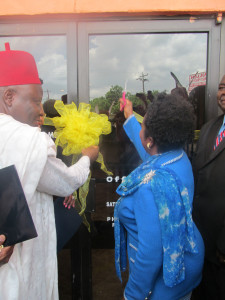
South Park and the Sunnyside Area are known and often times categorized African American communities that lack the essentials that a thriving neighborhood needs.
Fresh market grocery stores, and clinics that are affordable are in high demand. Dr. Bernadette Iguh, R.N., M.D. saw the need and prayed to God for the chance to bring health to the African American community and so she did.
July 12, 2014, Dr. Iguh held a lavish Grand Opening Ceremony for Cullen Family Practice Clinic 7710 Cullen Blvd Houston Texas 77051. As a practicing Registered Nurse (R.N.) for 14 years, Dr. Iguh believed in quality health care and with a spiritual touch.
“Bernadette had her own ideas on how to do treatments so she went on to medical school. She became a doctor,” said a close friend and colleague of Dr. Iguh.
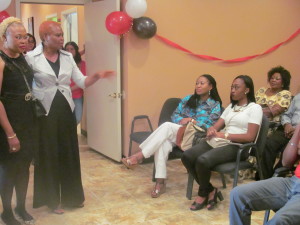
Many people stood up and spoke on the quality of person and work that she represented and what a blessing she would be to the South Park and Sunnyside communities.
Dr. Iguh has practiced as a Medical Doctor (M.D.) since 2005. She saw the need in the particular area and vetted for a place to open shop.
“I am very familiar with this community, I worked in the South Park area for five years” said Dr. Iguh. “I have donated services to the community and I felt the need to be here.”
Her community service now extend beyond food giveaways as Cullen Family Practice will be open Monday through Friday 9 am- 6pm and on Saturdays by appointment only.
Dr. Iguh accepts all types of insurance.
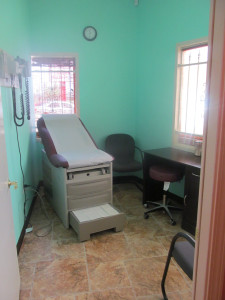
Inside the clinic there are six exam rooms and an immunization room. It is a family medicine clinic that treats pediatric to geriatric patients.
Iguh’s husband and children are a part of her working environment as her husband helped restructure the building to become a clinic and her daughter is a nurse.
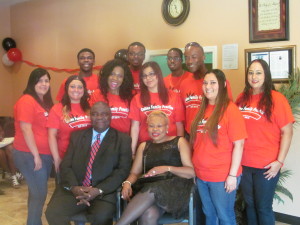
“This use to be a feed house for animals, now it is a place of health for humans,” said Dr. Iguh’s husband.
Congresswoman Sheila Jackson Lee read a proclamation before the ribbon cutting and dignitaries from Africa flew all the way to South Park Houston, TX to celebrate the opening of Cullen Family Practice.
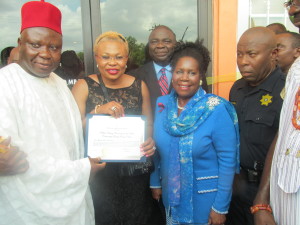
Cavity Prevention Can Save You THOUSANDS
By: Dr. Ka Ron Wade
The Houston Sun
The Data and Analysis Center reviewed more than 77 million Delta Dental claims and found that—over a lifetime—a single cavity can have serious economic consequences down the road.
We can help you prevent tooth decay and save you a bundle!
With new advances in Dental Technology and Treatment, we can stop tooth decay from progressing and beautifully restore damaged teeth.
Once restored, proper home care will help your restorations last; however, there is no such thing as a “permanent dental restoration.”
That’s why we are so passionate about having you and your family come in for routine dental exams to help prevent tooth decay. That means not waiting until you’re in pain to call us!
Keep Your “Pearly Whites” Pristine!
A new study shows that since all restorations are “temporary,” the lifetime cost of treating just one molar that started with a small filling—on average—is about $2,187.
Multiply that by several teeth and you’ll come up with lots of reasons you’d rather enjoy spending your hard-earned money on other things!
Let’s face it, by comparison—an exam costs next to nothing. And this is where real prevention comes in.
We now know that when good oral hygiene is coupled with regular dental visits and cleanings—cavities are almost entirely preventable.
Yet, 90 percent of all adults have had one or more cavities.
And nearly 80 percent of young people have had a cavity by age 17.
We don’t’ want you or your family to become another dental statistic.
When caught early, we can restore the form and function of your decayed teeth before more serious damage occurs.
If you really want to keep your pocketbook and your pearly whites happy…preventive dentistry is the way to go!
For breakthrough dental technology,
GIVE US A CALL TODAY!
For More Information, call us at 713.654.7756 or visit our web-site at www.cosmeticdt.com
Watch: What the Affordable Care Act Means For You [3 Minute Video]
Need affordable health insurance?
Need affordable health insurance?
There are new health care options available!
 Open enrollment begins today, and Texans can shop and sign up for plans through March 2014. In addition, individuals and families between 100 and 400 percent of the federal poverty level (FPL) may be eligible to receive assistance with their premiums.
Open enrollment begins today, and Texans can shop and sign up for plans through March 2014. In addition, individuals and families between 100 and 400 percent of the federal poverty level (FPL) may be eligible to receive assistance with their premiums.Information about these new health insurance plans and how to apply for Medicaid and the Children’s Health Insurance Program can be found at www.healthcare.gov or by calling 1-800-318-2596.
Some important things to keep in mind:
- For individuals who are not eligible for assistance in the marketplace, premiums will still be affordable.
- According to estimates from US Department of Health and Human Services, premiums before tax credits are expected to be more than 16 percent lower than estimated.
- In Texas, an average of 54 qualified health plans are anticipated to be selling coverage in the marketplace – increasing competition and lowering costs for consumers.
- With tax credits, premiums will be even more affordable. For example, a 27 year old in Texas making $25,000/year could pay $133 per month for the lowest cost silver plan and $83 per month for the lowest cost bronze plan after tax credits. For a family of four making $50,000/year in Texas, premiums could be as low as $239 per month for a silver plan and $57 per month for a bronze plan after tax credits.
Still work to do
While this is exciting news, we still have more work to do to ensure that all Texans have access to quality, affordable health care.
As you may know, Texas has the highest uninsured rate in the nation with more than one in four lacking coverage – around 6 million people. In Houston, nearly one in three people are without health insurance. Lack of adequate health insurance coverage makes it hard for Texas families to get the health care they need, and if and when they do it often leaves them with large medical bills.
In fact, study after study has shown that one of the best ways to protect and improve the health of individuals and families is by expanding access to quality health insurance. Children do better in school and miss fewer days when they have health insurance. Parents and guardians can also provide a more consistent environment for their children to grow up in when the whole family is healthy.
Expanding access to health insurance is such an important issue that I worked tirelessly this past session to amend Medicaid expansion language onto every possible bill. Unfortunately, the Legislature failed to take action or provide an alternative plan to cover our most vulnerable populations, leaving hundreds of thousands of Texans with incomes below 100 percent of the FPL without health insurance options.
Percent uninsured by county
It’s time to expand Medicaid!
Expanding Medicaid would have provided an estimated 1.5 million uninsured Texans with health coverage. This not only makes good sense for the health of our communities and the state – it also makes good business sense. For an investment of $15 billion, Texas could draw down as much as $100 billion in federal funds over 10 years. In addition, this expansion is estimated to generate more than 300,000 Texas jobs annually over 10 years. According to a well-respected economist, Texas would see a return of $1.29 for every $1 spent on Medicaid expansion, which means it pays for itself.
The expansion of Medicaid costs less in four years than what Texas hospitals spend on the uninsured population in one year. Currently, hospitals absorb more than $5 billion per year in uncompensated care, a loss that is passed on to you in the form of higher health care costs and direct taxes in areas that have hospital districts.
The needs of these individuals will not disappear if Texas fails to expand Medicaid, but the state will continue to lose out on a nine-to-one match and pass the cost down to local hospitals and ultimately to taxpayers. If you are one of the more than one million hard-working Texans who was left out of coverage options, please visit TexasLeftMeOut.org to sign the petition and tell your story.
I will continue to advocate for Medicaid expansion, and I hope I can count on your assistance to inform your family and friends about these new health insurance options and the importance of expanding coverage in our state.
Sincerely,

Rodney Ellis
The Houston Sun Press Run
Help celebrate 30 years of publishing the Houston Sun. Help fund 30 scholarships for 30 Journalism and Business students. Register to participate in The Houston Sun’s Press Run.
Registration: 713-524-0786 www.houstonsun.com
What: Press Run
Who:Race Participants; individuals, groups, organizations, churches, businesses
When: September 28, 2013
Where:Houston Sun to Emancipation Park
How Much:Entry Fees are:
Adults:$30
Children:10-17 $15
Children 9 & Under FREE
Senior Citizens:$20
Time: Event:
6:00 am- 7:00 am Registration
7:00 am Opening Ceremonies
7:15 am Wheel Chair, Family
Walk 7:30 am 5K, 10K
9:15 am Press Run Awards

